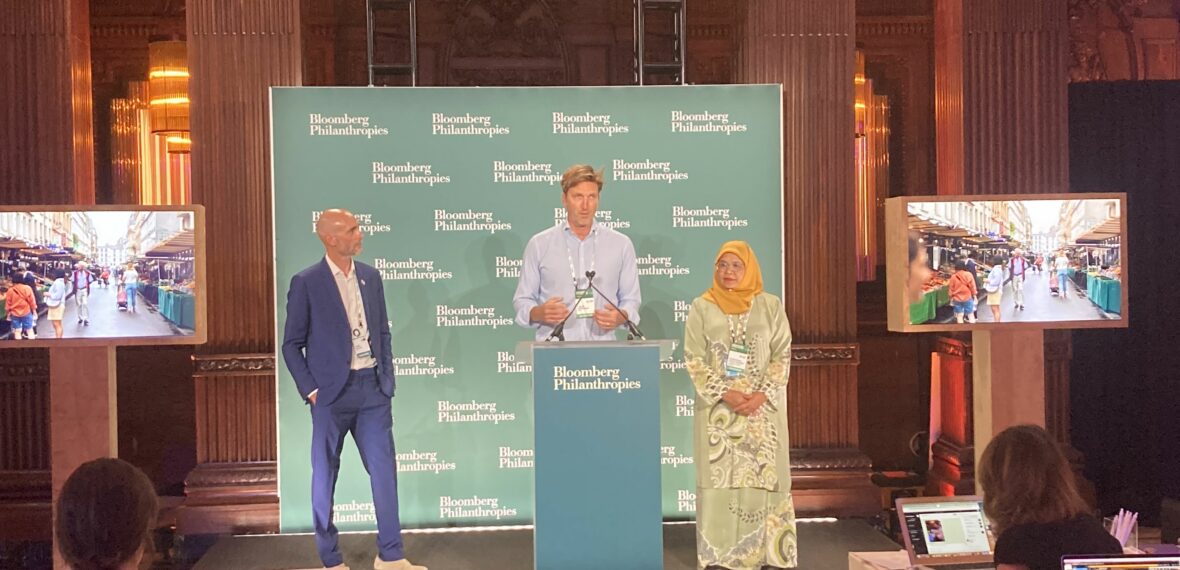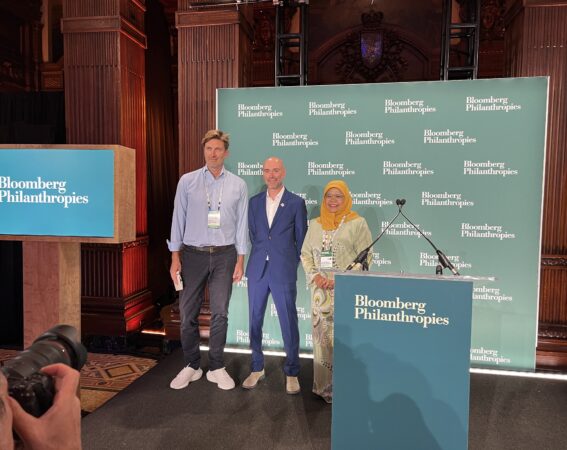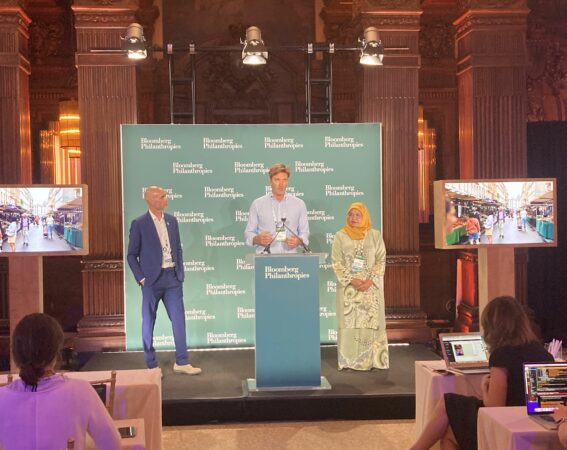C40 and Nrep to collaborate on 15-minute city pilots

• C40 announces a partnership with Nrep to fund a new Green and Thriving Neighbourhoods programme, deliver proof of concept for «15-minute city» policies and empower cities around the globe to implement ambitious net-zero and people-centred neighbourhoods
• The programme will implement neighbourhoods pilot projects in at least five cities, and create an international network of practitioners to advise cities
• Strategic partners include UN-Habitat and the Sorbonne University’s Carlos Moreno
C40 is joining forces with Nrep to launch the Green and Thriving Neighbourhoods programme and support interdisciplinary approaches that make urban areas more sustainable, equitable and liveable.
The programme will deliver proof of concept for «15-minute city» policies and empower cities around the globe to implement ambitious net-zero and people-centred neighbourhoods. The programme will implement pilot projects in at least five cities. It will also create a dedicated international network of city practitioners that will work together, advise and learn from one another to build and expand green and thriving urban neighbourhoods.
Compact and resource-efficient cities, with co-location of residences and jobs, mixed land use and good access to public transportation, can help cut urban emissions by around 25%, according to the Intergovernmental Panel on Climate Change (IPCC).
Strategic partners in C40’s new Green and Thriving Neighbourhoods programme include UN-Habitat and the Sorbonne University’s Carlos Moreno, recognised for his work on a framework for 15-minute cities that expands access to a variety of jobs, housing types, goods and services, including green spaces and clean air, to residents.
C40 Executive Director Mark Watts said: “The 15-minute city helps to realize an ‘ecological society’ that urban residents and their leaders strive for. By promoting polycentric urban development and a thriving local lifestyle in every neighbourhood, it can help cities to reduce emissions and pollution from cars while improving quality of life. This new programme will empower cities to implement the concept on the ground, and to deliver ‘green and thriving neighbourhods’ pilot projects.”
Nrep CEO and Partner Claus Mathisen said: “As much as 60-70% of the world’s CO2 emissions come from cities, so the quest for greener urban solutions is urgent. This partnership is an opportunity to shape what a sustainable and equitable city is and to create a blueprint for urban development that will help not only cities to drive ambitious urban policies but also business and other stakeholders to engage and adapt their operational models.”
Maimunah Mohd Sharif, Executive Director of UN-Habitat and Under-Secretary General of the United Nations, said: “The built stock of our cities and towns will double by 2050. How we meet the climate crisis depends on the quality of what we build, where we build, and how we build it. Past urban development models increasingly promote sprawl and segregation. We must find our way back to urbanise in harmony with nature and people. A model like the 15-minute city can help us to do this, but must be accompanied by the right policy and fiscal instruments.”
Carlos Moreno, Director of Sorbonne University’s ETI Lab, said: “The 15-minute city framework can help cities to increase sustainability, inclusion and economic equity. The framework can contribute to the deep decarbonisation of cities, and it can be adapted to a variety of contexts.”
The vast majority of the world’s greenhouse gas emissions come from cities, and especially their built environment and transport systems. As urban populations continue growing, it is urgent to harness a model of low-carbon urban development that is human-scale and thriving. At the heart of the city lies an opportunity, as urban density can create the possibility for a greener way of living and a better quality of life through more efficient infrastructure and improved urban planning.
IPCC has stressed the importance of integrated spatial planning, and highlighted the concept of the 15-minute city in which urban life is organised so that people can access all the services they need within their immediate vicinity, and where it’s easy to walk or bike to work and stores.
The past two years have witnessed a surge of interest in the idea of the 15-minute city. The COVID-19 pandemic has galvanised discussions about the city as a system that enables citizens to live more locally and sustainably. It increases the opportunity for multiple “complete neighbourhoods” that cut emissions and improve quality of life in an integrated way.
In this context, neighbourhoods provide a new focus to respond to the urgency of the global climate agenda. The neighbourhood provides an ideal scale for equitable and sustainable recovery and an opportunity to develop replicable, people-centred and net-zero approaches that can be deployed city-wide and beyond.
Taking advantage of the balance between scale and agility, neighbourhoods are sufficiently large to aggregate the interrelated elements that compose a city, yet small enough for tangible changes to be achieved in a relatively short period. Acting as “innovation labs,” neighbourhood projects can pioneer new policy, trial innovative partnership arrangements, consider creative ways to increase citizen participation and test new technologies or solutions.
Nrep adds know-how and experience from some of the world’s most sustainable large-scale development projects, including Copenhagen’s UN17 Village and Nordhavn, which has been designed around the principles of the 15-minute city. The partnership between C40 and Nrep will empower cities around the world to implement ambitious net-zero “15-minute city” neighbourhoods. It will develop integrated climate actions at the neighbourhood scale that can be applied in both new and existing neighbourhoods.
For more information on 15-minute cities, please visit the C40 Knowledge Hub.
About C40 Cities Climate Leadership Group
C40 is a network of nearly 100 mayors of the world’s leading cities who are working to deliver the urgent action needed right now to confront the climate crisis and create a future where everyone, everywhere can thrive. Mayors of C40 cities are committed to using a science-based and people-focused approach to help the world limit global heating to 1.5°C and build healthy, equitable and resilient communities. Through a Global Green New Deal, mayors are working alongside a broad coalition of representatives from labour, business, the youth climate movement and civil society to go further and faster than ever before.
The current Chair of C40 is Mayor of London Sadiq Khan; three-term Mayor of New York City Michael R. Bloomberg serves as President of the Board. C40’s work is made possible by our three strategic funders: Bloomberg Philanthropies, Children’s Investment Fund Foundation (CIFF), and Realdania.
About Nrep
Nrep is an urban investor that seeks to improve the built environment of cities, to the benefit of all stakeholders. Nrep takes a sustainable, long-term approach when investing across real estate segments, primarily residential, logistics, care homes and offices. Activities also include green real estate credit solutions as well as investments in climate technologies serving urban environments. The company has invested in more than ten “gigacorns,” climate technology companies with the potential to save gigatons of CO2.
Nrep manages 7 million square metres of real estate projects across Denmark, Finland, Sweden, Norway and Poland, and has committed to achieving a net-zero real estate portfolio by 2028. Nrep is recognised as a pioneer within the area of sustainability and has more than 600 employees across Europe, and assets of €18 billion under management.

